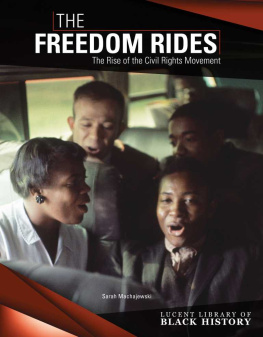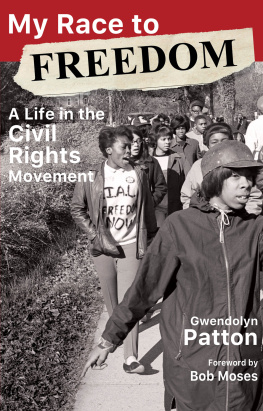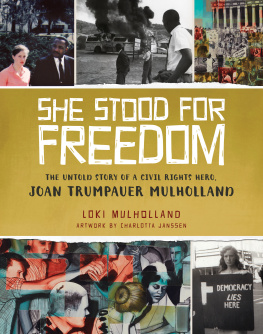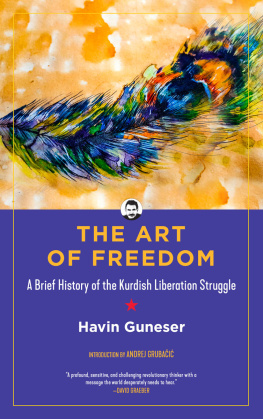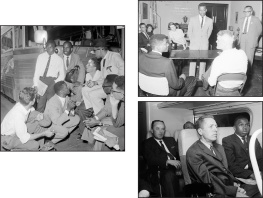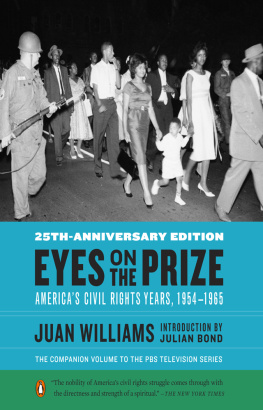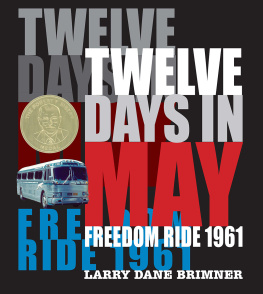FREEDOM RIDERS
FREEDOM RIDERS
1961 and the Struggle for Racial Justice
Abridged Edition
RAYMOND ARSENAULT


Oxford University Press, Inc., publishes works that further
Oxford Universitys objective of excellence
in research, scholarship, and education.
Oxford New York
Auckland Cape Town Dar es Salaam Hong Kong Karachi
Kuala Lumpur Madrid Melbourne Mexico City Nairobi
New Delhi Shanghai Taipei Toronto
With offices in
Argentina Austria Brazil Chile Czech Republic France Greece
Guatemala Hungary Italy Japan Poland Portugal Singapore
South Korea Switzerland Thailand Turkey Ukraine Vietnam
Copyright 2006, 2011 by Raymond Arsenault
Published by Oxford University Press, Inc.
198 Madison Avenue, New York, NY 10016
www.oup.com
Oxford is a registered trademark of Oxford University Press
All rights reserved. No part of this publication may be reproduced,
stored in a retrieval system, or transmitted, in any form or by any means,
electronic, mechanical, photocopying, recording, or otherwise,
without the prior permission of Oxford University Press.
Library of Congress Cataloging-in-Publication Data
Arsenault, Raymond.
Freedom riders : 1961 and the struggle for racial justice/
Raymond Arsenault. Abridged ed.
p. cm. (Pivotal moments in American history)
Includes bibliographical references and index.
ISBN 978-0-19-975431-1 (pbk.)
1. African American civil rights workersHistory20th century.
2. Civil rights workersUnited StatesHistory20th century.
3. African AmericansSegregationSouthern StatesHistory20th century.
4. Segregation in transportationSouthern StatesHistory20th century.
5. African AmericansCivil rightsSouthern StatesHistory20th century.
6. Civil rights movementsSouthern StatesHistory20th century.
7. Southern StatesRace relationsHistory20th century. I. Title.
E185.61.A69 2011
323.092dc22 2010037533
9 8 7 6 5 4 3 2 1
Printed in the United States of America
on acid-free paper
For
John Hope Franklin
the Freedom Writer
19152009
Parts of this manuscript previously appeared in a different form and are republished with permission: You Dont Have to Ride Jim Crow: CORE and the 1947 Journey of Reconciliation, in Before Brown: Civil Rights and White Backlash in the Modern South. ed. Glen Feldman, 2167 (Tuscaloosa: University of Alabama Press, 2004); You Dont Have to Ride Jim Crow, Stetson Law Review 34 (Winter 2005): 343411; One Brick at a Time: The Montgomery Bus Boycott, Nonviolent Direct Action, and the Development of a National Civil Rights Movement, in Sunbelt Revolution: The Historical Progression of the Civil Rights Struggle in the Gulf South, 18662000, ed. Samuel C. Hyde Jr., 15389 (Gainesville: University Press of Florida, 2003); and Taking the Road to Freedom, Forum 28 (Spring 2004): 3035.
Contents
List of Maps
Preface
Fifty years ago, during the spring and summer of 1961, the Freedom Riders set out to change the world. Amazingly, they did so by simply boarding a bus, not as blacks or whites restricted by an outmoded system of racial discrimination, but as free and full citizens of a democratic nation. The Freedom Riders knew that federal law and the Constitution of the United States protected their right to travel together, even in the Deep South where local law and custom mandated racial separation. But they also knew that they might be injured or even killed for trying to exercise that right. When riots ensued, the potential violence became all too real, and a nation recoiled in horror. Unfazed, the Freedom Riders kept coming, more than four hundred in all, filling the freedom buses and marching into the jails of the Jim Crow South. In the process, this interracial, nonviolent army forced John F. Kennedys administration to confront the immediacy of a civil rights struggle that had captured the worlds attention. By the end of the year, a sweeping desegregation order was in effect, and the federal government was moving toward active involvement in the struggle for racial justice.
The Freedom Riders victory was the first of many civil rights triumphs achieved during the 1960s. Indeed, as the decade progressed the improbable story of the Freedom Rides became part of an unfolding saga of democratic promise and renewal. Almost inevitably, however, as the spotlight shifted from the burning bus in Anniston to the attack dogs and fire hoses of Birmingham, and later to Freedom Summer in Mississippi, Bloody Sunday in Selma, and the mean streets of Chicago and Watts, the Freedom Rides were reduced to a mere prelude, both in the public mind and in the world of civil rights scholarship.
This was the unfortunate situation that I discovered in 1998, as I began to research and write the first scholarly book on the Freedom Rides. Amazingly, nearly four decades had passed since the end of the Freedom Rides, yet historians had failed to produce a single book or article on the subject. Though puzzled by this curious oversight, I embraced the opportunity to amend the historical record, especially after signing a contract to publish my book in Oxford University Presss new Pivotal Moments in American History series. At this early stage in my research, I couldnt be sure that the Freedom Rides represented an historical milestone of that magnitude. Indeed, no one other than me, my editors, and the Freedom Riders themselves seemed to regard the Freedom Rides as anything approaching a pivotal moment in American history. Fortunately, the 1998 publication of Congressman John Lewiss eloquent memoir, Walking with the Wind, which includes a riveting narrative of his participation in the Freedom Rides, steeled my courage and spurred me onward.
As I dug deeper into the Freedom Rider story, poring over archival records and interviewing scores of Riders, any doubts about the pivotal nature of the Rides disappeared. The resolute courage and commitment of the Freedom Riders had brought nonviolent direct action and grassroots insurgency to the center stage of American public life, prompting an unprecedented governmental response to unconstitutional infringements of freedom and civic equality. Initiating an era of tumultuous social change, the decision to challenge Jim Crow frontally but nonviolently provided a new model of activist citizenship, radically altering the nations prospects for democratic reform. Considering all that followed, from the student and womens movements to the broader rights revolution, the Freedom Rides more than met the standard of pivotal importance.
Even so, the American public, including the scholarly community, has been slow to recognize the significance of the Freedom Rides as an historical turning point. As recently as 2001, when the Freedom Riders held two fortieth-anniversary celebrationsone in Jackson, Mississippi, where many Riders had been arrested in 1961, and a second rolling reunion featuring a partial recreation of the first Freedom Ride from Atlanta to Anniston and Birminghamthere was minimal press coverage and little scholarly attention, other than my feverish attempt to interview as many Freedom Riders as I could.
But that was then, before the recent rediscovery of the Freedom Riders extraordinary sacrifices and contributions. How different the landscape of history and memory looks now as we approach the fiftieth anniversary of the Rides. No fewer than four books on the Freedom Rides have appeared during the last seven years. In 2008, the National Endowment for the Humanities awarded a million-dollar grant to WGBH Public Television to produce an
Next page

